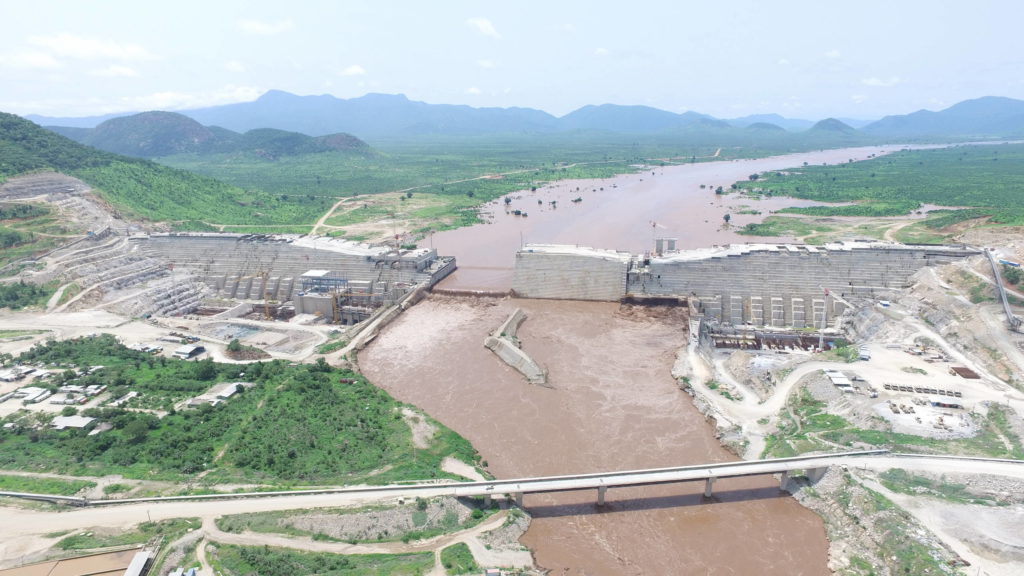Ethiopia says two turbines of the Great Ethiopian Renaissance Dam (GERD) are expected to generate power next August as it goes ahead with its timelines in the construction of the controversial dam on the Blue Nile.

The Chief Executive Officer of the Ethiopian Electric Power, Asheber Balcha, told a one-day symposium on Wednesday, March 17, 2021 as part of the 10th anniversary of the official commencement of the GERD, that the country had lost huge sums of money due to delays on the dam.
The official Ethiopian News Agency (ENA) quoted Balcha as saying “activities are now intensified to complete the construction of this flagship project”. Currently, the overall construction of the dam is 79 per cent.
ENA also quoted Ethiopian Water, Irrigation and Energy Minister, Sileshi Bekele, as confirming that Ethiopia would start the second phase of filling the dam this raining season, brushing aside concerns from Sudan and Egypt, the two who want a halt to the filling of the dam until a binding agreement that guarantees the exchange of information, operation guarantees, environmental and social management.
“We will fill the second phase of the dam reservoir without any reason in the coming raining reason as per our milestones,” he said.
Bekele said that 13.5 billion cubic meters of water will be retained in the months of July and August.
Ethiopia has said the dam is essential for its development, while Egypt and Sudan worry about access to vital water supplies from the Nile.
The dam is expected to secure access to electricity for the majority of Ethiopians, to foster economic development and to provide revenues from the sale of surplus electricity abroad.
For its part, Sudan expects the new dam will not only help regulate the flow of the Nile and prevent devastating floods but also provide access to cheap energy. However, it fears the new dam will hinder the yield of its own dam – Roseires – situated within a short distance downstream.
Egypt too is worried about the potential impact of the new dam on its own Aswan High Dam, and that it will give Ethiopia control over the flow of the Nile and reduce the fresh water available for Egyptians.
Bekele said that Ethiopia was committed to conclude the trilateral negotiations under the auspices of African Union (AU), recalling that Ethiopia, Sudan and Egypt began negotiations under the auspices of the AU based on the principle of “resolving Africa’s problems with African solutions”.
He said Ethiopia has had a discussion with Democratic Republic of Congo (DRC), the current chairman of the AU, on Ethiopia’s position on the dam.
“Now we are waiting for the start of trilateral negotiations that will be led by DRC,” he stated.
Ethiopia says it negotiates for the “equitable share and reasonable utilization of the Nile River without causing significant harm to the downstream countries”.
Deputy Prime Minister and Foreign Affairs Minister, Demeke Mekonnen, said earlier that no one would prevent the country from exercising its “just right” of using the Nile River for its development.
This is as the war of words continues between Ethiopia, Sudan and Egypt on the construction of the GERD on the Blue Nile.
“No one would stop Ethiopia from exercising its right over the use of the Nile,” he said, pointing out that his country contributes 86% of the water in the river.
The Sudanese Prime Minister, Dr. Abdalla Hamdouk, last week wrote to the AU, United Nations, European Union and United States reiterating its call to them to mediate in the impasse on the construction of the GERD.
Dr. Hamdouk suggested, in the letter he sent on 13 March to the quartet, that the method used in the negotiations, which led to the failure to reach an agreement between the three parties during the past negotiation period, should be changed.
The Sudanese Prime Minister said that the quartet would boost the role of the African Union (AU) in the negotiation process adding that the Democratic Republic of the Congo, as the chair of the current session of the AU, shall continue to coordinate and lead the quartet committee.
Earlier, Sudan and Egypt on March 6, during a visit to Sudan by Egyptian President Abdul-Fattah Al-Sisi, called for the return to “serious and effective negotiations” on the GERD as the project directly affected them.
